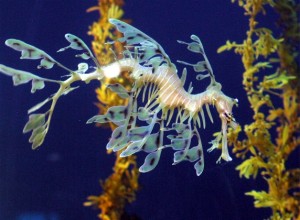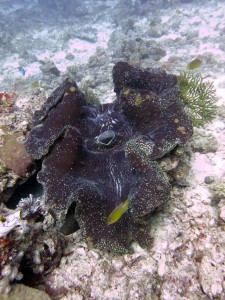An alien planet lives closer than we ever would’ve expected. Not far beneath the surface of the water lies a mostly undiscovered world, complete with its own set of aliens.

Leafy Dragon (Photo Courtesy of: Wikimedia Commons)
Coral reefs may look like they don’t belong on our own planet, but this world is not as isolated as we may think. In fact, our actions, above and below water, can have drastic consequences on their world.
Audio clip: Adobe Flash Player (version 9 or above) is required to play this audio clip. Download the latest version here. You also need to have JavaScript enabled in your browser.
The Giant Clam is only one of many species being affected by human activity. Coral reefs and their marine inhabitants around the world are in serious danger of being lost forever. Unfortunately, it has already begun to happen. Reefs face
many challenges today, including increasing sea temperatures due to climate change as well as increasing ocean acidity. In addition, pollution and larger sediment loads on the reefs are also causing stress to the ecosystem. However, according to Krista Greer, it is overfishing of these reef ecosystems that often push them over the edge. Greer, a researcher for The Sea Around Us Project says:
“There are all sort of outside stresses, [and] maybe the reef can handle one or two of them, but when you also add overfishing, there’s a breaking point.”
We often think of commercial and industrial fishing as being the major cause of overfishing, but even smaller scale fishing practices can impact the ecosystem. Due to this manner of thinking, many places around the world are unaware that they’re fishing to a point beyond what is sustainable for the reef. This is the case with many island communities, such as Cocos (Keeling) Island.

Although not every species is affected by human fishing activity, the loss of even a single species can lead to an overall decline of ecosystem health. Overfishing is the final straw that can cause the delicately balanced ecosystem of coral reefs around the world to collapse.

Cocos (Keeling) Island Locals (Photo Courtesy of: Saripedia)
The first step in remedying this situation is implementing appropriate management of fisheries throughout the world. However, it is not enough to simply create laws and policies regarding fishing. Education is crucial, especially in small island communities as the local people need to understand the consequences of their actions. Krista Greer says,
“In order for it to actually work … they need the local population to be on board. They’re not going to be there to watch and regulate and enforce, so they need … the local population to do that.”
A global effort is needed if we are ever to start on the road to recovery. If our current actions don’t change, we risk losing this mysterious and enchanting world forever, before we have a chance to fully discover it. Can we really live with the sharp consequences that our hooks cause?
-Monica Leslie, Richelle Eger, Justin Sidhu
Audio Credits:
Sound Effects/Music Courtesy of: iMovie, Garage Band Narrated By: Richelle Eger

